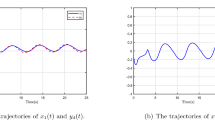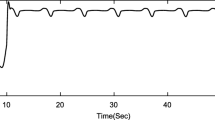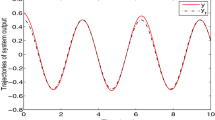Abstract
In this article, we solve the fast finite-time stabilization as well as adaptive fuzzy control design issues for a class uncertain stochastic nonlinear systems. Firstly, a new fast finite-time control scheme is proposed in virtue of generalizing the fast finite-time adaptive control strategy for deterministic systems to the stochastic case. Next, a novel adaptive fuzzy control strategy is developed to simultaneously deal with the stochastic nonlinear systems with completely unknown nonlinearities as well as the disturbances term. Then, stability analysis have been given based on a Jensen’s inequality. Finally, two simulations examples is presented to illustrate the effectiveness of the proposed control scheme.
Similar content being viewed by others
References
Z. G. Pan and T. Basar, “Adaptive controller design for tracking and disturbance attenuation in parametric strict-feedback nonlinear systems,” IEEE Transactions on Automatic Control, vol. 43, no. 8, pp. 1066–1083, 1998.
J. Y. Zhai and W. T. Zha, “Global adaptive output feedback control for a class of nonlinear time-delay systems,” ISA Transactions, vol. 53, no. 1, pp. 2–9, 2014.
Q. Zhou, H. Y. Li, C. W. Wu, L. J. Wang, and C. K. Ahn, “Adaptive fuzzy control of nonlinear systems with unmodeled dynamics and input saturation using small-gain approach,” IEEE Transactions on Systems, Man, and Cybernetics: Systems, vol. 47, no. 8, pp. 1979–1989, 2017.
X. L. Jia, S. Y. Xu, G. Z. Cui, B. Y. Zhang, and Q. Ma, “Global adaptive regulation of feed-forward nonlinear time-delay systems by output feedback,” International Journal of Robust and Nonlinear Control, vol. 27, no. 14, pp. 2451–2472, 2017.
Z. Y. Sun, C. Y. Liu, S. F. Su, and W. Sun, “Robust stabilization of high-order nonlinear systems with unknown sensitivities and applications in humanoid robot manipulation,” IEEE Transactions on Systems, Man, and Cybernetics: Systems, vol. 51, no. 7, pp. 4409–4416, 2021.
R. E. Precup, S. Preitl, and P. Korondi, “Fuzzy controllers with maximum sensitivity for servosystems,” IEEE Transactions on Industrial Electronics, vol. 54, no. 3, pp. 1298–1310, 2007.
B. Chen, X. P. Liu, K. F. Liu, and C. Lin, “Direct adaptive fuzzy control of nonlinear strict-feedback systems,” Automatic, vol. 45, no. 6, pp. 1530–1535, 2009.
M. Wang, B. Chen, K. F. Liu, and S. Y. Zhang, “Adaptive fuzzy tracking control of nonlinear time-delay systems with unknown virtual control coefficients,” Information Sciences, vol. 178, no. 22, pp. 4326–4340, 2008.
C. Y. Li, S. C. Tong, and W. Wang, “Fuzzy adaptive high-gain-based observer backstep** control for SISO nonlinear systems,” Information Sciences, vol. 181, no. 11, pp. 2405–2421, 2011.
S. C. Tong, X. Min, and Y. X. Li, “Observer-based adaptive fuzzy tracking control for strict-feedback nonlinear systems with unknown control gain functions,” IEEE Transactions on Cybernetics, vol. 50, no. 9, pp. 3903–3913, 2020.
Y. Wu and X. J. **e, “Adaptive fuzzy control for highorder nonlinear time-delay systems with full-state constraints and input saturation,” IEEE Transactions on Fuzzy Systems, vol. 28, no. 8, pp. 1652–1663, 2020.
C. C. Ku, W. J. Chang, M. H. Tsai, and Y. C. Lee, “Observer-based proportional derivative fuzzy control for singular Takagi-Sugeno fuzzy systems,” Information Sciences, vol. 570, pp. 815–830, 2021.
H. F. Ho, Y. K. Wong, and A. B. Rad, “Adaptive fuzzy approach for a class of uncertain nonlinear systems in strict-feedback form,” ISA Transactions, vol. 47, no. 3, pp. 286–299, 2008.
S. Bhat and D. Bernstein, “Finite-time stability of continuous autonomous systems,” SIAM Journal on Control and Optimization, vol. 38, no. 3, pp. 751–766, 2000.
F. Wang, B. Chen, and J. Li, “Finite-time adaptive fuzzy tracking control design for nonlinear systems,” IEEE Transactions on Fuzzy Systems, vol. 26, no. 3, pp. 1207–1216, 2018.
Y. M. Li, T. T. Yang, L. Liu, G. Feng, and S. C. Tong, “Finite-time optimal control for interconnected nonlinear systems,” International Journal of Robust and Nonlinear Control, vol. 30, no. 8, pp. 3451–3470, 2020.
H. G. Zhang, Y. Liu, and Y. C. Wang, “Observer-based finite-time adaptive fuzzy control for nontriangular nonlinear systems with full-state constraints,” IEEE Transactions on Cybernetics, vol. 51, pp. 1110–1120, 2021.
L. Liu and S. H. Ding, “A unified control approach to finite-time stabilization of SOSM dynamics subject to an output constraint,” Applied Mathematics and Computation, vol. 394, pp. 125752, 2021.
L. D. Fang, S. H. Ding, J. H. Park, and L. Ma, “Adaptive fuzzy control for nontriangular stochastic high-order nonlinear systems subject to asymmetric output constraints,” IEEE Transactions on Cybernetics, vol. 52, no. 2, pp. 1280–1291, 2022.
M. M. Gao, J. S. Zhao, and W. Sun, “Stochastic H2/H∞ control for discrete-time mean-field systems with Poisson jump,” Journal of the Franklin Institute, vol. 358, no. 6, pp. 2933–2947, 2021.
H. Y. Li, L. Bai, Q. Zhou, R. Lu, and L. J. Wang, “Adaptive fuzzy control of stochastic nonstrict-feedback nonlinear systems with input saturation,” IEEE Transactions on Systems, Man, and Cybernetics: Systems, vol. 47, no. 8, pp. 2185–2197, 2017.
W. S. Chen and L. C. Jiao, “Finite-time stability theorem of stochastic nonlinear systems,” Automatica, vol. 46, no. 12, pp. 2105–2108, 2010.
J. L. Yin, S. Y. Khoo, Z. H. Man, and X. H. Yu, “Finite-time stability and instability of stochastic nonlinear systems,” Automatica, vol. 47, no. 12, pp. 2671–2677, 2011.
X. Yu, J. L. Yin, and S. Y. Khoo, “Generalized Lyapunov criteria on finite-time stability of stochastic nonlinear systems,” Automatica, vol. 107, no. 12, pp. 183–189, 2019.
F. Wang, B. Chen, Y. M. Sun, Y. L. Gao, and C. Lin, “Finite-time fuzzy control of stochastic nonlinear systems,” IEEE Transactions on Cybernetics, vol. 50, no. 6, pp. 2617–2626, 2019.
S. Sui, C. L. Chen, and S. C. Tong, “Fuzzy adaptive finite-time control design for nontriangular stochastic nonlinear systems,” IEEE Transactions on Fuzzy Systems, vol. 27, pp. 172–184, 2019.
W. J. Sun, M. M. Gao, and J. S. Zhao, “Adaptive fuzzy finite-time control for a class of stochastic nonlinear systems with input saturation,” International Journal of Fuzzy Systems, vol. 24, pp. 265–275, 2022.
Z. Y. Sun, M. M. Yun, and T. Li, “A new approach to fast global finite-time stabilization of high-order nonlinear system,” Automatica, vol. 81, pp. 455–463, 2017.
B. Chen and C. Lin, “Finite-time stabilization-based adaptive fuzzy control design,” International Journal of Fuzzy Systems, vol. 29, no. 8, pp. 2438–2443, 2020.
Z. Y. Sun, Y. Shao, and C. C. Chen, “Fast finite-time stability and its application in adaptive control of high-order nonlinear system,” Automatica, vol. 106, pp. 339–348, 2019.
W. J. Sun, J. S. Zhao, W. Sun, J. W. **a, and Z. Y. Sun, “Adaptive event-triggered global fast finite-time control for a class of uncertain nonlinear systems,” International Journal of Robust and Nonlinear Control, vol. 30, no. 9, pp. 3773–3785, 2020.
Z. Y. Sun, C. Q. Zhou, C. C. Chen, and Q. H. Meng, “Fast finite-time partial state feedback stabilization of high-order nonlinear systems with output constraint and dynamic uncertainties,” Journal of the Franklin Institute, vol. 357, no. 16, pp. 111189–111216, 2020.
F. Ding and T. Chen, “Parameter estimation of dual-rate stochastic systems by using an output error method,” IEEE Transactions on Automatic Control, vol. 50, no. 9, pp. 1436–1441, 2005.
J. W. Wang, Y. Ji, and C. Zhang, “Iterative parameter and order identification for fractional-order nonlinear finite impulse response systems using the key term separation,” International Journal of Adaptive Control and Signal Processing, vol. 35, no. 8, pp. 1562–1577, 2021.
J. W. Wang, Y. Ji, X. Zhang and L. Xu, “Two-stage gradient-based iterative algorithms for the fractional-order nonlinear systems by using the hierarchical identification principle,” International Journal of Adaptive Control and Signal Processing, vol. 36, no. 7, pp. 1778–1796, 2022.
F. Ding and T. Chen, “Combined parameter and output estimation of dual-rate systems using an auxiliary model,” Automatica, vol. 40, no. 10, pp. 1739–1748, 2004.
L. Xu, “Separable multi-innovation Newton iterative modeling algorithm for multi-frequency signals based on the sliding measurement window,” Circuits Systems and Signal Processing, vol. 41, no. 2, pp. 805–830, 2022.
L. Xu, “Separable Newton recursive estimation method through system responses based on dynamically discrete measurements with increasing data length,” International Journal of Control Automation and Systems, vol. 20, no. 2, pp. 432–443, 2022.
X. Zhang and F. Ding, “Hierarchical parameter and state estimation for bilinear systems,” International Journal of Systems Science, vol. 51, no. 2, 275–290, 2020.
M. H. Li and X. M. Liu, “Maximum likelihood hierarchical least squares-based iterative identification for dualrate stochastic systems,” International Journal of Adaptive Control and Signal Processing, vol. 35, no. 2, pp. 240–261, 2021.
X. Zhang, F. Ding, and E. F. Yang, “State estimation for bilinear systems through minimizing the covariance matrix of the state estimation errors,” International Journal of Adaptive Control and Signal Processing, vol. 33, no. 7, pp. 1157–1173, 2019.
M. H. Li and X. M. Liu, “Iterative identification methods for a class of bilinear systems by using the particle filtering technique,” International Journal of Adaptive Control and Signal Processing, vol. 35, no. 11, pp. 2056–2074, 2021.
X. Zhang and F. Ding, “Optimal adaptive filtering algorithm by using the fractional-order derivative,” IEEE Signal Processing Letters, vol. 29, pp. 399–403, 2022.
Author information
Authors and Affiliations
Corresponding author
Ethics declarations
No potential conflict of interest was reported by the authors.
Additional information
Publisher’s Note Springer Nature remains neutral with regard to jurisdictional claims in published maps and institutional affiliations.
This work is supported by National Natural Science Foundation of China under Grant 62173208, Taishan Scholar Project of Shandong Province of China under Grant tsqn202103061, Shandong Qingchuang Science and Technology Program of Universities under Grant 2019KJN036.
Yixuan Yuan received her B.Sc. degree in mathematics and applied mathematics from the School of Mathematical Sciences, Heze University, Heze, China, in June 2020. She is studying for an M.S. degree in Liaocheng University. Her current research interests include stochastic systems, finite time control, and adaptive fuzzy control.
Junsheng Zhao was born in 1981. He received his M.S. degree from Qufu Normal University in 2006, and a Ph.D. degree from Southeast University, China, in 2015. He was a Visiting Scholar with the Department of Mathematics and Statistics, University of Strathclyde, UK, in 2020. Since 2006, he has been with the School of Mathematical Science, Liaocheng University, where he is currently an associate professor. His current research interests include stochastic control, adaptive control, and stability theory of stochastic systems.
Zong-Yao Sun was born in 1979. He received his M.S. degree from Qufu Normal University in 2005, and a Ph.D. degree from Shandong University, China, in 2009. He was a Visiting Scholar with the Department of Electrical and Computer Engineering, University of Texas at San Antonio, USA, in 2016. Since 2009, he has been with the Institute of Automation, Qufu Normal University, where he is currently a professor. His current research interests include nonlinear control, adaptive control, and stability theory of time-delay systems. Prof. Sun won the Title of Taishan Scholar in 2021, and was awarded the Shandong Province Outstanding Tutor of Graduate Students in 2019.
Yaqi Gu obtained her B.Sc. degree in mathematics and applied mathematics from the School of Mathematical Sciences, Mathematics University, Liaocheng, China, in June 2022, where she is currently pursuing an M.S. degree. Her current research interests include stochastic nonlinear systems and event-triggered control.
Xue**g Zhao received her B.Sc. degree in mathematics and applied mathematics from Huihua College of Heibei Normal University, China, in June 2022. She is currently studying for an M.S. degree in the School of Mathematical Sciences, Liaocheng University. Her current research interests include stochastic nonlinear systems and finite-time control.
Rights and permissions
About this article
Cite this article
Yuan, Y., Zhao, J., Sun, ZY. et al. Fast Finite-time Adaptive Fuzzy Control for Stochastic Nonlinear System. Int. J. Control Autom. Syst. 21, 4123–4132 (2023). https://doi.org/10.1007/s12555-022-0758-4
Received:
Revised:
Accepted:
Published:
Issue Date:
DOI: https://doi.org/10.1007/s12555-022-0758-4




